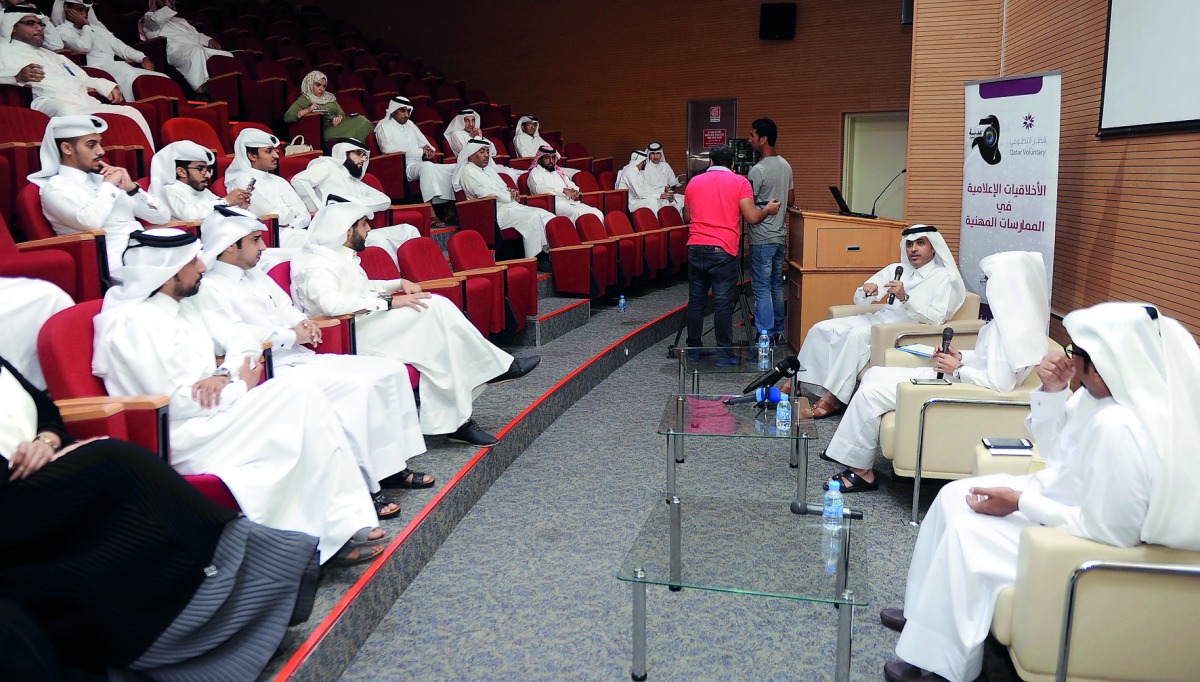
Dr. Khalid Mubarak Al-Shafi, Editor-in-Chief of The Peninsula, talking at a symposium on “Media Ethics in Professional Practices” held at Qatar University.
Dr. Khalid Mubarak Al-Shafi, Editor-in-Chief of The Peninsula, has said that every profession has its own ethics including journalism and media and the ethics is like an umbrella to protect people.
“When we see a media outlet using abuses then we should know that it is a corrupt media house. The journalists have ethics which they must follow themselves for their society,” Dr. Al-Shafi said while talking on a symposium titled “Media Ethics in Professional Practices” held at Qatar University on Saturday.
The event was organised by Qatar Voluntary Center in collaboration with Qatar University (QU) and held at Research Complex at QU in which a number of students and journalists participated.
Dr. Al-Shafi also stressed on the importance of taking information from reliable sources and official sources and not depending on rumours and hearsay. “In Qatar, journalists are monitoring themselves before anyone else monitors them. And there exist no need for anyone to push them to do this or don’t do this because it is a kind of personal duty,” Dr. Al-Shafi said.
“Although journalists have the right of expression, they are also responsible of what they are writing. In case anyone spreads fake news and uses defamation or doesn’t respect the media ethics can be exposed to legal accountability to guarantee the rights of others,” Dr. Al-Shafi noted.
He said that the media ethics must be translated and seen in the professional work otherwise it would be nothing but ink on the paper. “The media can discuss all topics, but without abusing anyone or personalising issues,” he said.

On media behaviour as witnessed in some GCC countries and how they dealt with the current situation, he said that behaviour was not a media behaviour. “They are fabricating news stories and spreading fake news.”
“When we read the speech of the Emir H H Sheikh Tamim bin Hamad Al Thani delivered recently, we find that he appreciated Qatari morality and ethics of its media although others have abused and attacked Qatar through the hired agents,” he said.
Dr. Al-Shafi added that Qatar had succeeded in managing the crisis due to support from the leadership and also from the media institutions. “The ‘Truth’ talk show on Qatar TV was an example of a successful talk show. The guests were discussing all viewpoints without hurling abuses at any country,” he observed.
“It is important to enhance the culture of criticism and tolerance and to accept others’ ideas even if we do not agree with them,” he said, adding that the social media had no credibility and could not replace the mainstream media.
Poet Radi Al Hajri, while giving an example of how Qatari media had dealt with crisis, said: “We have benefitted from the official directions given by Qatar Communication Office when it urged residents to be responsible while expressing opinions.”
“It is not easy when others abuse you and you don’t reply. We should be proud of our ethics because the crisis has changed Qataris to the best,” he said.

He also added that there was bad use of social media, which means it was hacked by hired agents to attack Qatar and its people.
Commenting on the symposium, Masoud Abdulhadi, Head of Media Section at Communications & Public Affairs Department at QU, said that the aim of the symposium was to create awareness among youth to deal with social media responsibly, especially in the current situation when truth and lies had been mixed.
“We have discussed how can youth know and get the truth as it is, and we give Qatar’s media as an example, which has dealt with crisis in the best possible way without abusing any country or people. It depends only on the truth.”
He said that the guests had discussions on the credibility and transparency of the media and the freedom of expressing opinion without abusing anyone. “Some media houses of the siege countries were used to disintegrate families and plant hatred among people which is not acceptable,” Abdulhadi added.
“We hope that the message of this event has reached especially to the youth and it will enhance critical thinking for any news they receive. When we deal with any media either traditional media or social media we only expose the truth without abusing anyone,” he said.